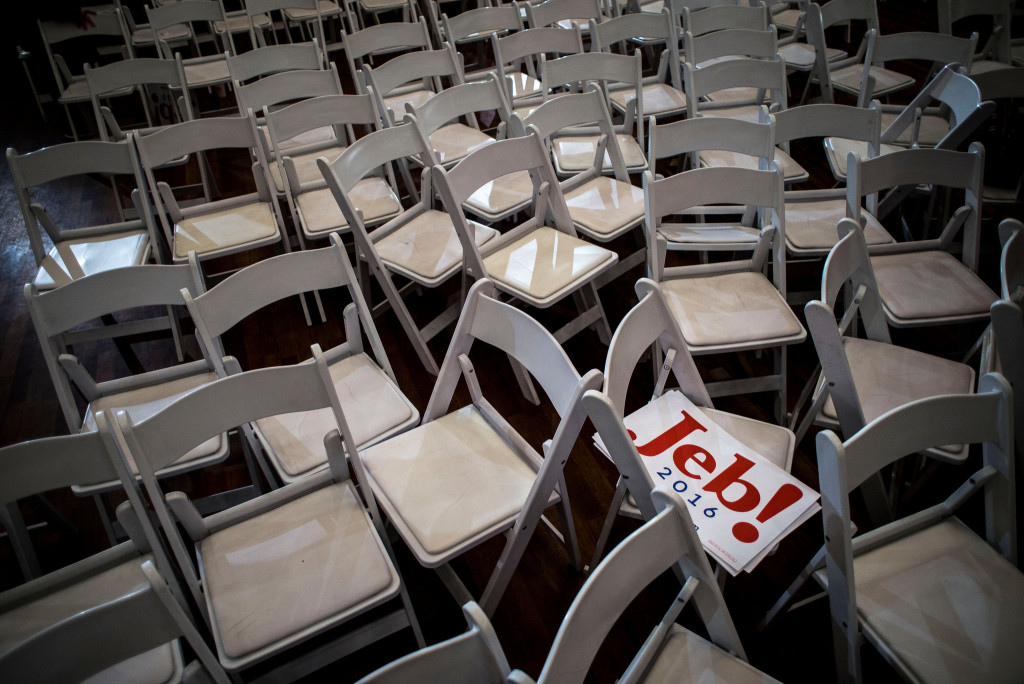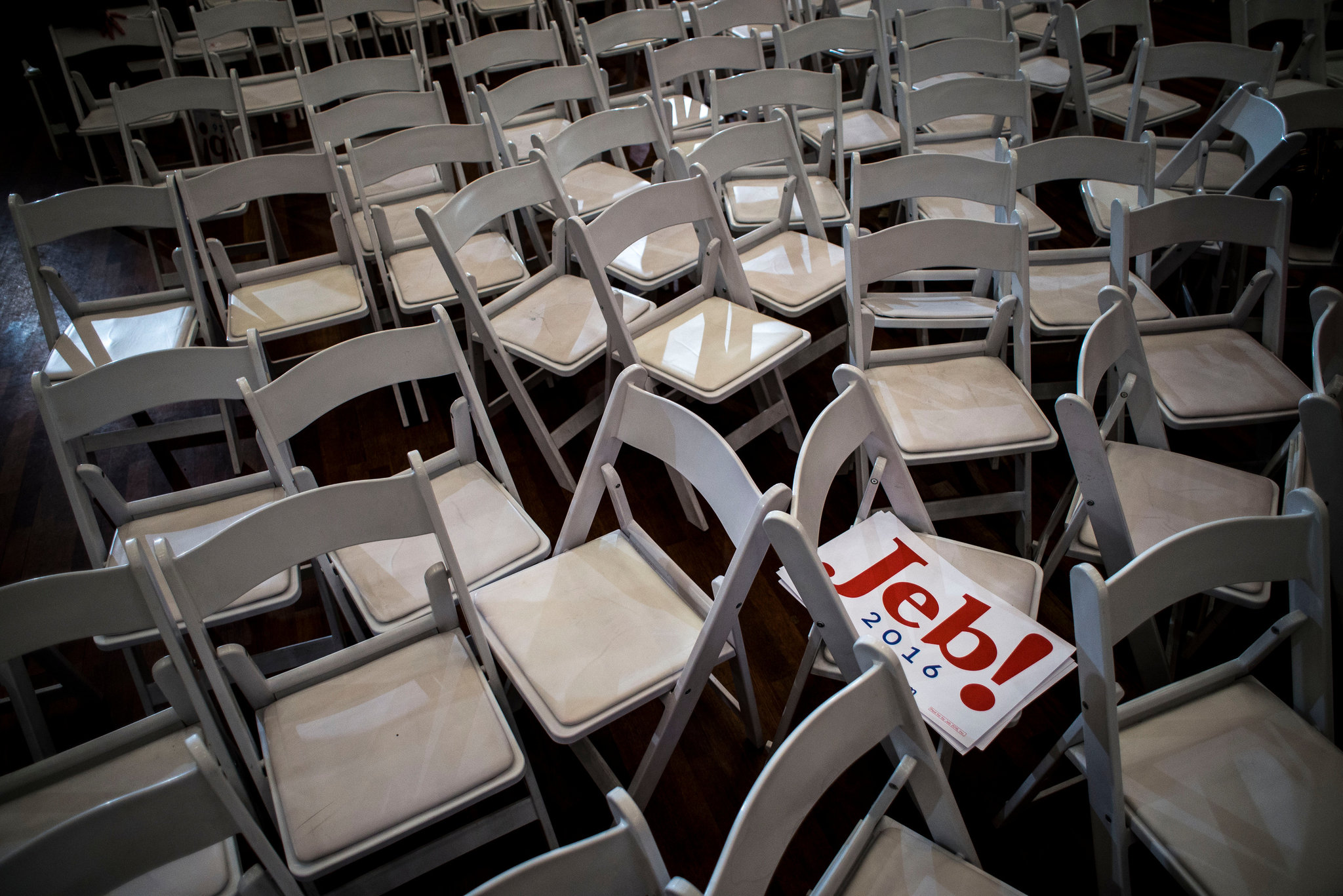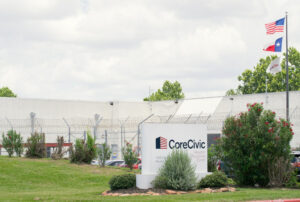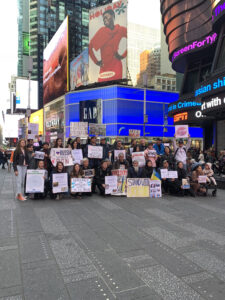Jeb Bush, Super PAC-Man

Picture by Gabriella Demczuk | The New York Times.

It was an unbelievable, record-setting amount of money.
In the first six months of 2015, the super PAC behind Jeb Bush’s presidential run, Right to Rise USA, had raised $103 million in support of the presumed Republican front-runner. In comparison, Mitt Romney’s entire winning primary campaign, super PAC expenses and otherwise, had totaled $107 million—and at this point, Bush had yet to announce his candidacy.
Less than a year later, the former governor of Florida suspended his campaign and Right to Rise USA was rendered legally inactive. Most of the almost $119 million total in contributions was gone, wasted on ads, private flights, accommodation, and voter outreach events; all for a candidate who didn’t make it halfway through the primary season.
Now, with Bush’s endorsement of Ted Cruz coming last week, the remaining $12 million in the super PAC has begun to be refunded to its donors. Right to Rise USA’s ineffectiveness is somewhat of an anomaly in Washington, but a pertinent reminder to those seeking election: In politics, money may get you a seat at the table, but it doesn’t guarantee results.
Only exploring…
“I am excited to announce I will actively explore the possibility of running for President of the United States,” said Jeb Bush over Twitter and Facebook in December of 2014. “In January, I also plan to establish a leadership PAC that will help me facilitate conversations with citizens across America to discuss the most critical challenges facing our exceptional nation.”
The phrases “actively explore” and “help me facilitate conversations” were important and necessary distinctions in Bush’s statement at the time. By law, candidates cannot coordinate directly with super PACs. Bush’s “exploratory” period lasted some unusually long six months, because he purposefully delayed his official announcement in order to participate in the PAC’s fundraising efforts with donors.
For a while, it looked as if the deferment was worth it. Right to Rise USA raised over $100 million in its first six months, a record haul, and one that many analysts thought might scare away other Republicans from even considering the presidency.
The delay didn’t hurt Bush either. He could run for president without technically “running,” skirting the system and organizing big donations to his PAC while “only exploring” his nomination chances. His status was in so little doubt, however, that he accidentally slipped up and admitted his candidacy in May before quickly reneging. The charade couldn’t last much longer. A month later, Bush announced his candidacy, now with more money behind him than every other Republican candidate combined.
Where the money went…
When Jeb Bush announced that he was running for president in June of 2015, Right to Rise USA had only spent $5 million. Over the course of the next few months, the PAC’s expenditures doubled, month over month, cumulating with a total of $82 million in ad buys alone by February. This was more than all other Republican ad buys put together ($65 million).
The total price tag on “voter contact” came to $89.8 million. Voter contact included all advertising, direct voter mail, targeted door knocks, and digital outreach. Fundraising costs by the super PAC were just under $6 million, and around $5 million was spent on polling, data analytics, political direction and research.
Other total campaign expenditures, including Right to Rise USA’s expenses, included consulting ($10 million), staff ($8.3 million), airfare ($3.3 million), and even valet parking ($15,800). The super PAC’s American Express bill was just under $220,000. Only $12 million of Right to Rise USA’s contributions went unspent, and that money is currently being paid out to donors who contributed over $1,000 on a pro-rata (proportional) basis.
Despite massive spending during these primary months, Bush failed to win in any state, culminating in his withdrawal after a disappointing and distant fourth-place finish in the historically pro-Bush South Carolina. His endorsement of Ted Cruz came 32 days later.
The fall…
In a different year and another election cycle, Jeb Bush and his fundraising efforts may have had more of a chance, and perhaps, more of an impact. But in the unpredictable and anti-establishment race of 2016, no amount of money spent on branding ($88,387) could make voters forget about the “low energy” label given to Bush by the likely Republican nominee, Donald Trump—a candidate who spends almost nothing on advertising.
The spectacular failure of Right to Rise USA is emblematic of the political season so far. Tactics once considered viable are now no longer sufficient. Politically incorrect has yielded to “telling it like it is.” Political experience, far from a prerequisite, now seems to be a millstone hanging from candidate’s necks.
A place at the political table in 2016 still has its price, but unfortunately for Jeb Bush, it isn’t strictly fiscal. In this roller-coaster ride of a Republican nomination, you must be at least this crazy to ride.
Tyler Eyre is currently pursuing his M.A. in Journalism at NYU, specializing in Business and Economic Reporting. He works at and writes for CNBC. He’s a staff writer at JPI and a contributor for NYU’s independent student newspaper, Washington Square News.






